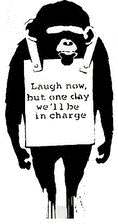Ken Doctor asks if there is a business model for news lurking in the midst of Apple, Twitter, Facebook et al. As all such pieces that begin this way, he concludes, maybe, but he's not sure how.
The correct answer is no, as long as the tech industry controls news distribution, nothing good is going to happen for journalism.
The linear way to think
Many journalism thinkers approach these questions linearly.
Here's what we do now.
Some new reality has taken hold.
Change what we do to continue to do what we used to do.
I liken it to picking up a box and moving it from one place to another. When you're done it's still a box. But the box must become a sled. Or a merry go round. When it's done it won't seem like a box.
Change makes things different
Look at the components that make up our online lives today.
Wikipedia wasn't a linear change from Britannica, for example because it didn't preserve Britannica's business model.
Tinder is radically different from the singles ads that used to run in local newspapers.
Spotify is fundamentally different from FM radio. So much so that Apple's new music service is re-introducing the idea of FM radio. It'll be interesting to see if we're interested in having our music programmed for us, since we've been able to do the programming for the last 15 years.
I think it's safe to extrapolate that news will work radically differently too.
Note: The title of this section is meant to be funny.
Two cents about Circa
 I've wanted to comment on Circa since they suspended operation.
I've wanted to comment on Circa since they suspended operation.
I think they were on to something. Starting topics, and then adding stories to each topic as the news comes in. A story isn't something that's published once and done, it's more of a process. It isn't just a linear re-shaping of what we did in the print era. Maybe now that they've suspended operations, one of their developers could do a YouTube demo of how the editorial tools worked? I'm sure I would find it interesting.
If the editorial tools were good and reasonably easy to use, I wish they would have made them the product, and hired journalists, as needed, to mold an editorial product created by the users of the product. Find the good stuff and surface it. That's how news must scale to meet the Web.
Circa resisted joining the open web. I think that was a fundamental mistake. They needed to find more readers, to do that they had to find the people who distribute links. Linkblogging is a real thing, and there are people who are good at it. But if there's no URL for each story, you can't linkblog it. So they didn't grow fast enough. I think this is almost mathematical. No one, going forward, should try this. Each story must have a way to get to it through a Web address. Even if Facebook et al own the distribution system.
How to
So if linear isn't the right way, what is?
Circa had the right approach. They asked: How can we create an incredibly fantastic new way of doing news that wasn't even remotely possible before the Web? Then, follow your nose. Build a prototype as quickly as possible, and use it. Iterate. Use it some more. Etc.
And that reminds me...
Use it!
Use it. Use it. Use it. Repeat that 10000 times. You need to use it. Or it won't work.
Why is Twitter failing where Facebook is thriving? Zuck was teasing them when he said they needed more stock to keep Wall St from interfering. Imho that's not great advice. Better: Twitter would be a formidable competitor if they had leadership that understood their own product. Zuck uses Facebook confidently and skillfully. There's the difference. Leadership of users, because the top guy is a user.
There's never been a long-term thriving tech company that wasn't run by a user.
If you're not excited by news, get out of the way
If you don't love the product, move aside and make way for someone who does.
Think about it this way, if you wanted to run a brewery, but you didn't love beer, how great would the product be? Not too great. Or if you ran a ski area, but didn't like to ski. How could you judge whether an idea is good or not? Take a poll? Run a focus group? That only works (somewhat) for established businesses, not revolutionaries, disrupters, innovators. If you want to make a big difference you have to have a big ego and a big vision. There's something inside you that has to come out. And you won't take no for an answer.
It's true in tech, but it's also true in news. Maybe that never occurred to anyone that news, at one time, was itself new. It's now so old and set in its ways that even the slightest bit of movement, even if it's just an experiment, is thought of as progress.
But now news is new, again. The question isn't how to remain what we always were, rather it's how to become what we now can be.